|
|
|
Sort Order |
|
|
|
Items / Page
|
|
|
|
|
|
|
| Srl | Item |
| 1 |
ID:
113916


|
|
|
|
|
| Publication |
2012.
|
| Summary/Abstract |
Bangladesh has achieved some impressive social and developmental goals in its health and education sectors. It has also effectively dealt with the adversities caused by the downturn of the global economy, and focused on strengthening its military capabilities to protect its national interests. However, environmental issues, growing international scrutiny about a fair war crimes trial, human rights concerns, the India-Bangladesh border, and transit and water sharing arrangements remain key challenges.
|
|
|
|
|
|
|
|
|
|
|
|
|
|
|
|
| 2 |
ID:
165076
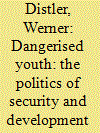

|
|
|
|
|
| Summary/Abstract |
International organisations, the national government and civil society alike have identified youth as a potential threat to the stability of the young state of Timor-Leste over the last decade. In this article, I ask how these actors define the danger of youth and what reasons they identify for the potential threat of young citizens for the society and state. Guided by a theoretical framework of Critical Security and Development Studies, I argue that while political manipulation as reason for youth violence was a prominent part of the security discourse in the years after the crisis in 2006, the discourse on the danger of youth in very recent international and national documents has been depoliticised. Despite decreasing numbers of youth-related violence, the threat construction has not vanished; rather, the language on youth has been adapted to the existing international discourse on violent youth as a threat to successful development. In this way, international and national actors have sustained the image of a society in need of management.
|
|
|
|
|
|
|
|
|
|
|
|
|
|
|
|
| 3 |
ID:
102683
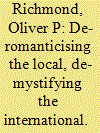

|
|
|
|
|
| Publication |
2011.
|
| Summary/Abstract |
Many actors involved in peacebuilding and statebuilding are acutely aware of the different roles of the 'local' in peacebuilding. Increasingly, this realisation has opened up tensions between the liberal peace and the realm of customary forms of politics and social structure. Peacebuilding may now be seen as a site of international assistance and local acquiescence, co-option or resistance. To understand these dynamics, the 'infrapolitics of peacebuilding' need to be uncovered. This article presents these dynamics in the cases of Timor Leste and the Solomon islands.
|
|
|
|
|
|
|
|
|
|
|
|
|
|
|
|
| 4 |
ID:
183899
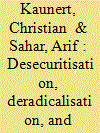

|
|
|
|
|
| Summary/Abstract |
This article assesses the processes and trends of desecuritisation through the deradicalisation of identity politics within the higher education sector in Afghanistan. It examines the desecuritisation of radicalisation through efforts directed at deradicalisation in the context of a securitised conflict environment. The article draws on the data generated through interviews and discussions with actors engaged with higher education. Higher education, while manipulated by numerous actors for ideo-political purposes, can function as a ‘desecuritisation’ and ‘deradicalisation’ mechanism by supplementing the statebuilding efforts, and more subtly, by providing a venue for critical teaching and learning processes. This article highlights that while the sector is typically a very low reconstruction priority, if addressed strategically, it has the potential to contribute to the desecuritisation of ethnic politics through the deradicalisation of ethnic grievances and hence function as a catalyst for effective and sustainable postwar recovery.
|
|
|
|
|
|
|
|
|
|
|
|
|
|
|
|
| 5 |
ID:
151529
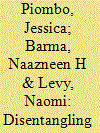

|
|
|
|
|
| Summary/Abstract |
While scholars and practitioners alike argue that the pursuit of sustainable peace in post-conflict developing countries requires international interventions to build state capacity, many debate the precise effects that external assistance has had on building peace in conflict-affected states. This paper seeks to clear conceptual ground by proposing a research agenda that disentangles statebuilding and peacebuilding from each other. Recent scholarship has made the case that the two endeavours are geared towards distinct sets of goals, yet few have subjected the causal mechanism underlying those processes or the relationship between them to sustained theoretical and empirical inquiry. Additionally, despite decades of mixed results from international interventions, we lack knowledge of the mechanisms by which external engagement leads to specific outcomes. To address these gaps, this paper offers a causal framework for understanding the effects of aid dynamics on state coherence and the depth of peace. It specifies the variables in that framework, with a view to establishing a new research agenda to advance our understanding of statebuilding and peacebuilding. Finally, it proposes that public service delivery in post-conflict countries offers fertile empirical ground to hypothesize about and test the relationship between state coherence and sustainable peace.
|
|
|
|
|
|
|
|
|
|
|
|
|
|
|
|
| 6 |
ID:
078776
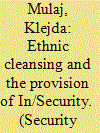

|
|
|
|
|
| Publication |
2007.
|
| Summary/Abstract |
The phenomenon of ethnic cleansing has either been considered by analysts from the point of view of history, or (ethnic) nationalism, or interpreted as the dark side of democracy. Underemphasized in the literature has been the link between the expulsion of targeted communities and the policy and practice of security. Yet, at various times, ethnic cleansing has been used as a security-creation mechanism in the process of nation-state building. Prioritization of the state in security policy and practice has provided justification for drastic measures against targeted peoples. This article seeks to offer a critique of the official rationale for the expulsion of targeted communities in terms of security. It contends that ethnic cleansing is flawed as a means of securing national security. Indeed, not only has ethnic cleansing resulted in humanitarian catastrophe, but the attainment of its stated objective - namely, the provision of security - can be unfeasible. Although state security remains an important value, its acquisition may no longer be justified independently of the means employed in its pursuit.
|
|
|
|
|
|
|
|
|
|
|
|
|
|
|
|
| 7 |
ID:
123262
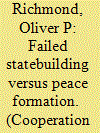

|
|
|
|
|
| Publication |
2013.
|
| Summary/Abstract |
This article outlines the often countervailing forces and norms of state formation, statebuilding and peacebuilding according to their associated theoretical approaches. It introduces a new concept of 'peace formation', which counterbalances a reliance on internal violent or externalised institutions' agency, reform and conditionality. Without incorporating a better understanding of the multiple and often critical agencies involved in peace formation, the states emerging from statebuilding will remain as they are: failed by design. This is because they are founded on externalised systems, legitimacy and norms rather than a contextual, critical and emancipatory epistemology of peace. Engaging with the processes of peace formation may aid international actors in gaining a better understanding of the roots of a conflict, how local actors may be assisted, how violence and power-seeking may be ended or managed and how local legitimacy may emerge.
|
|
|
|
|
|
|
|
|
|
|
|
|
|
|
|
| 8 |
ID:
110236
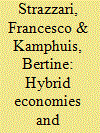

|
|
|
|
|
| Publication |
2012.
|
| Summary/Abstract |
How do informal and criminal economies transform over time, and what are the roles of armed conflict and "postconflict" intervention in this process? Based on four cases of contemporary statebuilding, this article explores the persistence and pervasiveness of extralegal economies in the face of intrusive international intervention and reflects on the implications for state formation. It observes that acting beyond the law is no prerogative of unmodern locals sitting in the antechamber of (liberally assisted) formal processes. The type of hybrid economic governance that emerges from the postconflict convergence of various levels of authority is often characterized by the selective reproduction of extralegal economic practices whose effects go well beyond the informal sector and crime boom typically registered in the immediate aftermath of violent conflicts.
|
|
|
|
|
|
|
|
|
|
|
|
|
|
|
|
| 9 |
ID:
110235
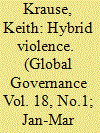

|
|
|
|
|
| Publication |
2012.
|
| Summary/Abstract |
This article unpacks the notion of hybrid violence and sketches the different forms of hybrid violence-categorical, institutional, motivational, and temporal-that can be found in many postconflict contexts. It highlights how attempts to establish a monopoly over the legitimate use of force are often at odds with the various roles that violence plays in contemporary states, especially (but not exclusively) in postconflict contexts. The article argues that in fact many of the shortcomings of the liberal peacebuilding paradigm stem from a failure to recognize that a hybrid political order existed before conflict erupted and that hybridized forms of violence were a critical element in shaping conflict dynamics in many postcolonial states.
|
|
|
|
|
|
|
|
|
|
|
|
|
|
|
|
| 10 |
ID:
084020
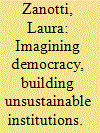

|
|
|
|
|
| Publication |
2008.
|
| Summary/Abstract |
This article employs theoretical tools devised by Michel Foucault to explore the political rationale, technologies of government, and unintended consequences of UN efforts at statebuilding and democratization in the context of the peacekeeping operation in Haiti. It aims to offer an empirically oriented contribution to the study of the modalities of international intervention in the post-Cold War period and the effects of transplanting institutional models. The article shows that the UN's political imaginary can be traced back to the texts that guided the reform of punishment institutions in Classical Europe. The United Nations saw its effort at statebuilding as centered upon making local institutions disciplined, visible, and centralized. The failure of the UN to achieve its stated goals is appraised in the contingent modalities of the encounter between an ethnocentric political imaginary that takes for granted that modalities of government can be transplanted with benign effects and local conditions of extreme poverty. The article concludes that, while purporting to build an independent, democratic, and well-functioning state, unreflectively imported political models foster disorder and dependence. They also reinforce the instruments of control and conditionality in the hands of international actors, thus fostering the carceralization of international spaces.
|
|
|
|
|
|
|
|
|
|
|
|
|
|
|
|
| 11 |
ID:
141474
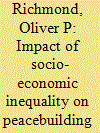

|
|
|
|
|
| Summary/Abstract |
Neoliberalism assumes that inequality creates productive competition and no risk of conflict where a viable state and social contract exists. From a critical position, inequality in a range of different forms (local to global in scale) weakens the links between civil society, solidarity, social justice, human rights and democracy. These positions have different implications for peace and order. State institutions are designed to make processes of consensual regulation permanent for the good of society. While continuing material inequality is inevitable, if the state and international community cannot mitigate its impact on security, rights and representation, in order to distribute a range of peace dividends, citizens rapidly begin to question the point of the state and undermine its legitimacy. Struggles over power, material resources and identity are thus untreated. This is especially problematic where the state also has been shaped through a peace agreement. Ironically, material inequality often lacking a Rawlsian justification of producing wider benefits of a peace dividend for society has been naturalised through peacebuilding and statebuilding, even though strong evidence suggests inequality is also at the root of many conflicts.
|
|
|
|
|
|
|
|
|
|
|
|
|
|
|
|
| 12 |
ID:
185078
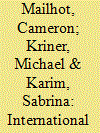

|
|
|
|
|
| Summary/Abstract |
The US and UN are two of the largest patrons of police reform programs worldwide: between 2000 and 2020, the US provided approximately $160 billion in police assistance to more than 130 countries worldwide; simultaneously, the UN spent over $77 billion supplying police-oriented security sector reform to countries experiencing or having experienced armed conflict, doing so through the deployment of peacekeeping missions and within the offices of UN Police, the UN’s hub for police reform and training programs. Though these two providers seek the same overall objective, they often vary in their specific goals: the US often engages in foreign police reform to promote its own national security objectives by increasing institutional capacity, while the UN adopts police reform programs to promote institutional constraint. The two models have important implications for how we understand bilateral and multilateral reform programs, including activities performed and recipient countries targeted across both time and space. Using originally collected data on US security assistance programs as well as a careful analysis of original data on UN mandates, this article provides the first quantitative exploration of these two different modes of assistance, comparing and contrasting their objectives and where, when, and how they are provided.
|
|
|
|
|
|
|
|
|
|
|
|
|
|
|
|
| 13 |
ID:
096194
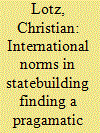

|
|
|
| 14 |
ID:
129575
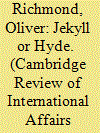

|
|
|
|
|
| Publication |
2014.
|
| Summary/Abstract |
As a response to the dynamics of state formation, statebuilding has not created model states in the last twenty years as was intended. Instead, the states that have emerged around the world are heavily contextually contingent. This is despite international attempts to shape them according to a common pattern, dominated by neoliberal models of statehood. This raises the question of what kind of hybrid states are actually forming as a result of the encounter between international statebuilding and local political dynamics? This article argues that international statebuilding aims to create neoliberal states and treats local political dynamics as dysfunctional. Yet from a local perspective the limitations of the statebuilding model are also apparent, as is the need for any locally legitimate state to be grounded in its context.
|
|
|
|
|
|
|
|
|
|
|
|
|
|
|
|
| 15 |
ID:
124435
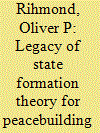

|
|
|
|
|
| Publication |
2013.
|
| Summary/Abstract |
The mainstream literature on state formation has provided the basis for peacebuilding and statebuilding praxes to focus on power and realist concepts of security and the state. The dominant focus on violence and how it shapes the state has been an important motif of peacebuilding and statebuilding literatures. However, state formation literatures also offer sociological, anthropological, and structural accounts as a basis for a post-colonial framework for peace, security, and order, which expose the limits of peacebuilding and statebuilding.
|
|
|
|
|
|
|
|
|
|
|
|
|
|
|
|
| 16 |
ID:
077205
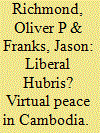

|
|
|
|
|
| Publication |
2007.
|
| Summary/Abstract |
The article examines the nature of the peace that exists in Cambodia by critiquing the 'liberal peace' framework. The authors claim that, despite the best efforts of international donors and the NGO community, liberal peacebuilding in Cambodia has so far failed in many of its key aims. The liberal peacebuilding project in Cambodia has been modified by a combination of local political, economic and social dynamics, international failings, and the broader theoretical failings of the liberal peacebuilding process. There have been some important successes, but serious doubts remain as to whether this project has been or can be successful, not least because of the ontological problem of whether the liberal peace is at all transferable. This raises the question of what type of peace has actually been built. The authors argue that the result of international efforts so far is little more than a virtual liberal peace
|
|
|
|
|
|
|
|
|
|
|
|
|
|
|
|
| 17 |
ID:
139228
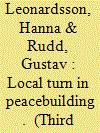

|
|
|
|
|
| Summary/Abstract |
This article is a literature review of the current local turn in peacebuilding. After a short introduction on the origins of ‘the local’ in peacebuilding, it gives an overview of current research and policy debates on the issue along two different lines. First, it emphasises the local in peacebuilding as a measure to increase peacebuilding effectiveness, as explored in the literature on the benefits of decentralisation and local governments for peace, as well as in the debates on local capacity and ownership as essential parts of peacebuilding policy. Second, it focuses on the local in peacebuilding as a means of emancipation and inclusion of local agency, expressed partly through the emphasis on voices from below and partly within the critical approaches to how the local has been interpreted in peacebuilding so far, arguing for a peacebuilding that is essentially local.
|
|
|
|
|
|
|
|
|
|
|
|
|
|
|
|
| 18 |
ID:
139234
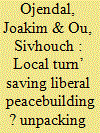

|
|
|
|
|
| Summary/Abstract |
The trajectory of the liberal peacebuilding project has encountered a fundamental critique of its failure to deliver the expected sustainable peace. This paper questions the approach with which it has been, and largely still is, pursued. We reflect on a more communicative, nuanced, contextual and time-bound approach. In particular, we identify the failure of the liberal peace to localise peace and to make it a part of everyday life in Cambodia. Nevertheless, we claim that liberal peace has unintentionally created space for progress, while a ‘local turn’ has proved significant. We demonstrate empirically that certain forms of local and everyday peace have emerged for the ‘wrong’ reason, and may evolve further. Hence, a local peace has gradually sunk in, although its liberal foundations remain virtual.
|
|
|
|
|
|
|
|
|
|
|
|
|
|
|
|
| 19 |
ID:
185638
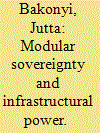

|
|
|
|
|
| Summary/Abstract |
This article uses the example of the Mogadishu International Airport zone and takes a spatio-temporal lens to explore how (sovereign) power unfolds in international interventions that aim at building a sovereign state. I show that the Mogadishu International Airport zone emerges as an elastic frontier zone that contradicts the sovereign imaginary intervenors aim to project and undermines many of the taken-for-granted boundaries that states tend to produce. The Mogadishu International Airport and similar zones emphasize the centrality of logistics and circulation in interventions, but also point towards their temporal and liminal character. Modularity became the material answer to the demand to secure circulation while adapting to the rapid rhythm and short timeframes of statebuilding. Modular designs enable the constant adaptation of the intervention terrain, allow intervenors to deny their power and imprint and facilitate the commercialization of supply chains and intervention materials. Sovereign power that operates through such zones becomes modular itself. It is exercised as an adaptable, in parts exchangeable, and highly mobile form of power that operates through crises and emergencies. The spaces and materials created by modular forms of sovereign power remain elusive, but nonetheless stratify experiences of power and security.
|
|
|
|
|
|
|
|
|
|
|
|
|
|
|
|
| 20 |
ID:
175501
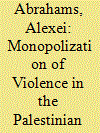

|
|
|
|
|
| Summary/Abstract |
Palestinians currently find themselves involved in two conflicts: an external one with the state of Israel, and an internal one with the leadership of the Palestinian national movement itself. In this essay, we argue that violence is overly monopolized in both conflicts. Firstly, Israel can safely ignore the peace process and renege on political concessions as long as Palestinians lack a credible militant threat. This threat, in turn, has been neutralized in large part by the Palestinian Authority (PA) itself, which has offered Israel increasingly effective security cooperation over the past decade. We argue that the PA’s decision to deepen security cooperation with Israel – in spite of its unpopularity among Palestinians – results from its own territorial monopolies on violence, which render it unaccountable to its constituents. Only by reintroducing a credible, latent threat of political-militant competitors to the PA will Palestinians be able to regain bargaining leverage over their own leadership, restore conditionality to their security cooperation with Israel, and put the peace process back on course.
|
|
|
|
|
|
|
|
|
|
|
|
|
|
|
|
|
|
|
|
|